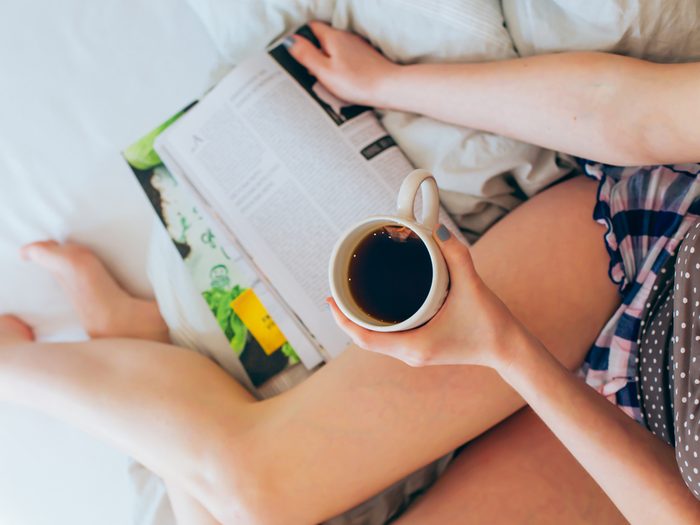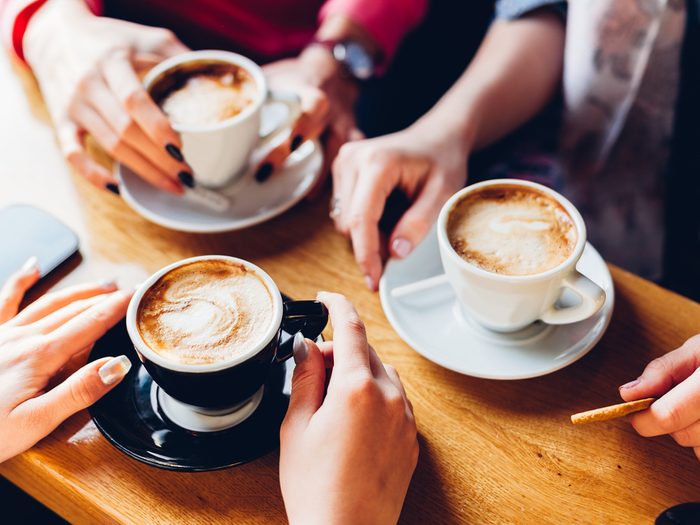
You feel anxious
Ruminating about an upcoming event or deadline can fuel your desire to grab a comforting mug of java. Yet, the National Institute of Mental Health recommends that people who suffer from anxiety avoid caffeine. Why? Caffeine can actually worsen the effects of anxiety, either by robbing you of proper sleep or triggering your flight or fight response, according to Everyday Health. Instead, try some deep breathing exercises or stress-busting meditations.

Your stomach hurts
You may associate stomach pains with spoiled food or PMS cramps. You should add your morning brew to that list as well. European scientists found that certain compounds in coffee stimulate the secretion of stomach acid by your stomach cells, according to WebMD. Taking an over-counter medication like Tums can neutralize the acid short-term, but if you suspect coffee is making your stomach hurt, think about changing your coffee consumption habits to feel your best.

Your heart is racing
The feeling that your heart is beating too fast can be frightening. It may feel like your heart is trying to escape from your ribcage. According to WebMD, these heart palpitations are often caused by the consumption of caffeine, nicotine, and even alcohol. In some cases, a racing heart can lead to dizziness and even fainting spells. Sadly, one of the only solutions to getting rid of constant heart palpitations is to avoid caffeine altogether.

You have diarrhea
Everyone knows that coffee can help keep you regular, thanks to its laxative properties. Drink more than two or three cups a day, though, and you might get diarrhea, according to the International Foundation for Functional Gastrointestinal Disorders. If you find your bathroom issues become unmanageable, the IFFGD recommends gradual withdrawal from caffeine. Consider trying these other home remedies for diarrhea.

You can’t sleep
Insomnia is a telltale sign of too much caffeine. Even if you swear coffee doesn’t have any effect on you, this tasty drink can still wreak havoc on your sleep cycle. According to Mayo Clinic, coffee can stay in your system for as long as 14 hours, increase the number of times you wake up during the night and decrease overall time asleep. To solve this problem, try to drink that last cup of coffee no later than noon.

You’ve got the jitters
Coffee makes you feel more alert, but sometimes that feeling turns into too much of a good thing. This is where the jitters come in. Caffeine speeds up your central nervous system, causing you to feel jumpy, according to Livestrong. Skip that fourth cup and stop the shakes.

You get headaches
A moderate amount of caffeine can help relieve a headache and make you feel better, by helping pain-relief medications work more effectively, according to the Cleveland Clinic. That’s why you’ll find caffeine as an ingredient in many over-the-counter headache drugs. However, if you drink too much coffee for a sustained amount of time (getting an daily excess of 500 mg of caffeine, or the equivalent of five cups of coffee) and you can go through caffeine withdrawal. The symptoms include headaches and fatigue, found Johns Hopkins researchers. Slowly decrease your caffeine intake—and look at all the possible sources in your diet, including coffee, headache drugs, tea, soda, and energy drinks.
